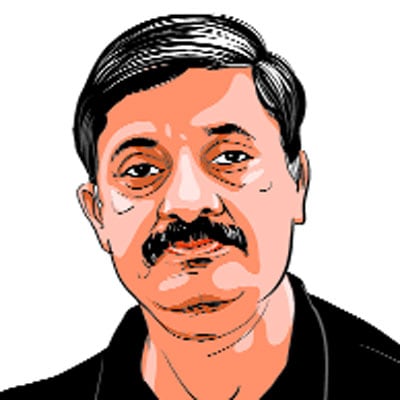Jan 6, 2025 06:55 IST
First published on: Jan 6, 2025 at 06:55 IST
With a possible trade war looming over the horizon, a move to inward-looking economies and conservative governments across the world, it is a good time to re-examine some fundamental assumptions we tend to make about the economy. It has been traditionally believed that greater capital inflows, production incentives to industry and cleaning up NPAs in the banking system is a good recipe to sustain high levels of growth. It is so much easier to focus on tangible factors like land, labor, capital and law; after all, governments can make policies about what is tangible. Yet we suggest that it is the intangible factors in this equation that may well be the necessary catalyst to growth.
One of the intangible factors that is seriously wanting in Indian society, is the marked absence of trust. There is a lack of trust between businesses, between business and government, between business and consumers. We tend to be so caught up in our daily lives that we forget the huge stresses that lack of trust creates for us. Businesses, especially small ones, spend so much time and energy on working to see that their payments come on time, in dealing with corrupt taxmen, in worrying whether land titles are safe. Cases of bounced checks clog up the justice system.
The majority of entrepreneurs in India today do not come from business families; there is no risk cushion to fall back upon. If only the stresses created by uncertainty over timely payments, land titles, corrupt officials were minimal, many more young people could either move into business or scale-up their enterprise. Lack of trust increases the costs of doing business and the stresses involved, exponentially.
Trust is what distinguishes modern societies from pre-modern societies. Hundreds of years ago, the circle of trust was limited only to family and friends. The growth of modern society has hinged on expanding the circle of trust beyond those whom we know personally.
Scientists have discovered that human beings are hard-wired to live in small communities of 150-200 people. The only means to move beyond this small size — to scale up society, to live together and work effectively — is to be able to find mechanisms that allow us to trust each other.
Today people expect that when they go out for work or to the market, they can do so safely. When we buy food, we trust that the quality of food is good, that milk is safe to drink, that the vegetables are safe to consume. We trust that our money is safe in banks. Trust underlies nearly all social transactions in modern society. Today people undertake big financial transactions on e-commerce websites with vendors whom they do not know. They do so because such websites have been able to build trust in a way that allows people to use payment gateways and complete transactions. Even a small school-level project depends on trust. Different people have to work together to make a design; to find parts for the project; learn how to integrate those parts together.
On the other hand, think about the costs imposed by a lack of trust. Think about the matter of securing your own home. When we go out, we shut the doors and windows. Some people install special locks and bars; Some install CCTV cameras. All of this costs a lot of money to install and maintain. Think about an alternate situation. About a locality so safe that no such need arises.
That automatically removes a lot of pressure from everyone’s mind. It allows citizens to move around rather than stay home and guard their house. It saves citizens’ money and provides them with peace of mind. It allows them time to explore more meaningful activities, for work or leisure.
Now imagine a situation in which it is not just the locality but the whole city that is safe. Think of the amount of time and money saved. Now scale this up to a whole society. And you can imagine the tremendous possibilities that we can unlock.
As a thought experiment, let us see if an enterprise like building greenfield cities could be achieved not by investing huge capital but by building trust. Building greenfield urban spaces that India needs urgently, is about trust between government and landowners, developers, private investors. Investable resources in the shape of land and money exist; Finding those resources depends on building trust with those who own the land and the money. Building trust is about building robust and predictable institutional mechanisms and about honoring contracts.
It has been estimated that to build a greenfield city, 2,500-3,000 hectares of land and nearly one lakh crore rupees in hard cash would be needed. Such a city could support a population of roughly five lakh people. It is not necessary for government to provide the cash; it is possible to find individual investors. But to find those investors, we need to build institutional mechanisms and draw up contracts that generate trust. The role of the government is not to offer viability gap funding but to help the owners of the land negotiate a deal with the investors, and further to help the owners to enforce the contract. India does not really have a shortage of capital but there is indeed a vast lack of trust.
On a busy road, we have to follow road rules to regulate movement. If each commuter were to move or stop as per their own convenience, there would be chaos. So, all decide to follow signals. That is how thousands of cars and trucks and scooters are able to navigate the roads.
Societies that have high levels of trust have lower costs of doing business. If we can create institutional systems that inspire trust between people, we can be so much more effective, prosperous, efficient. Let us think about how to build a society where we can trust each other. That is the future to look forward to.
Meeta Rajivlochan is secretary, Youth Affairs, Government of India. Views are personal. Rajivlochan is a historian based in New Chandigarh
Discover the benefits of our subscription!
Stay informed with access to our award-winning journalism.
Avoid misinformation with trusted, accurate reporting.
Make smarter decisions with insights that matter.
Choose your subscription package



